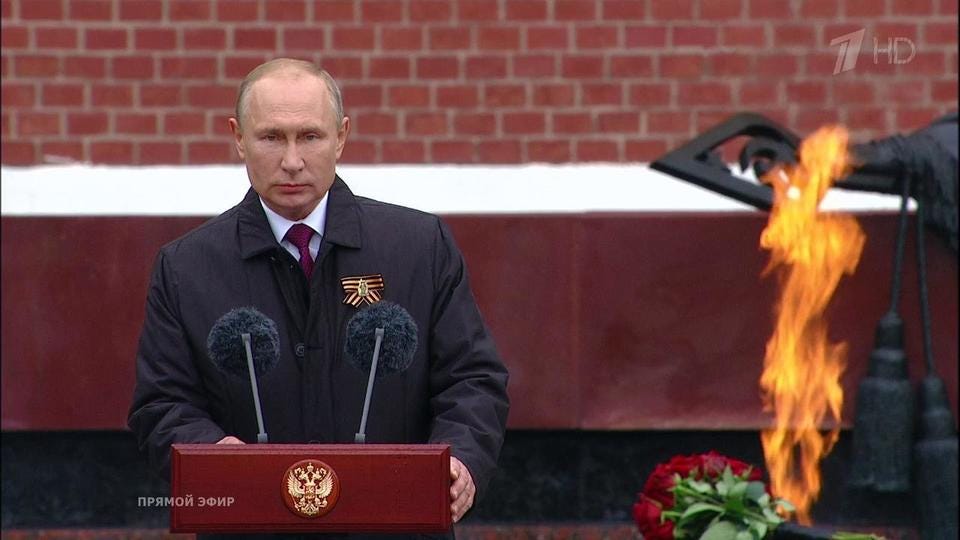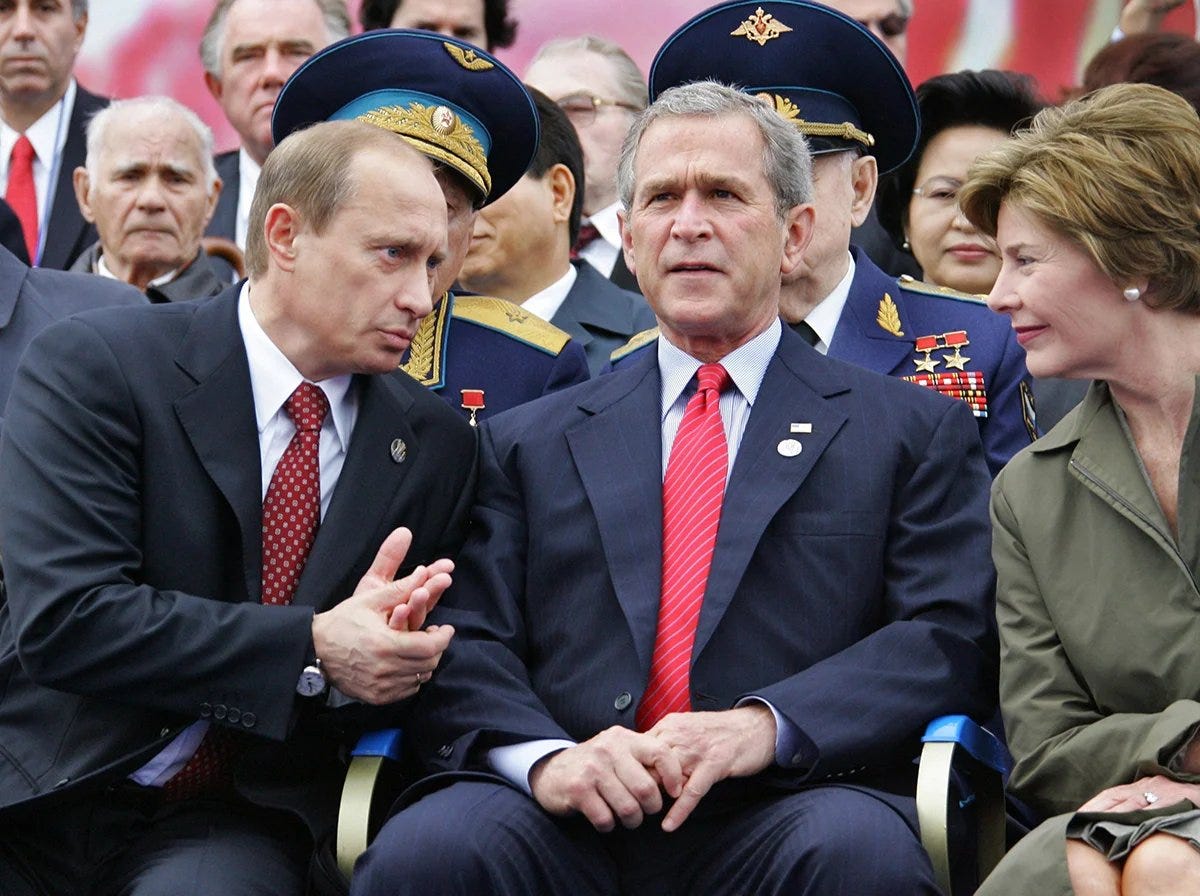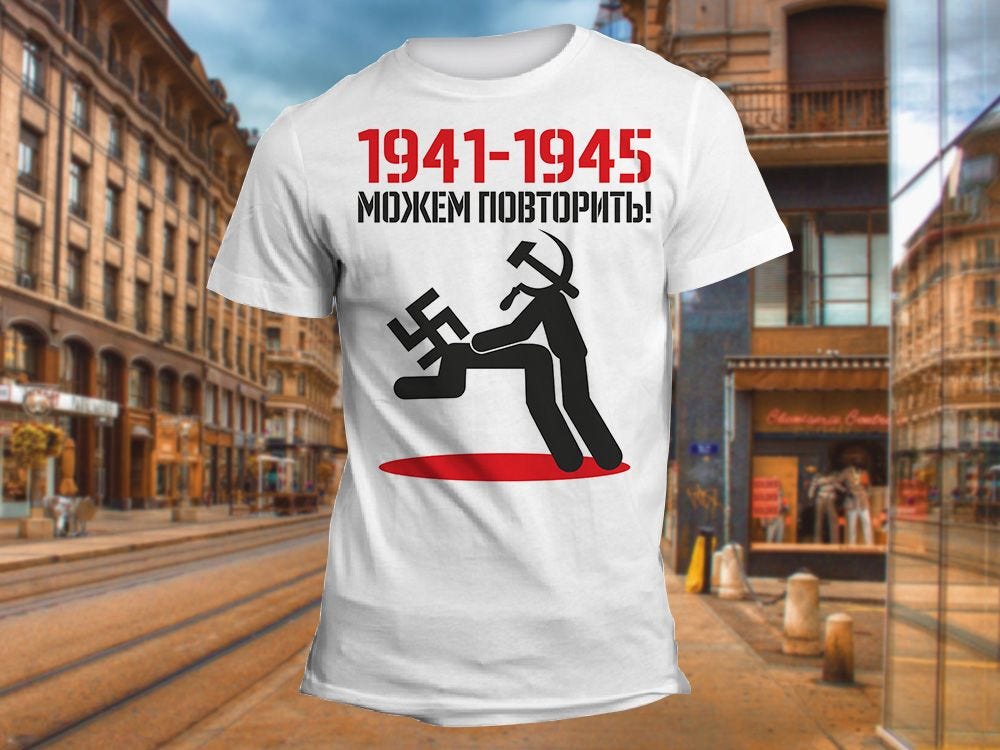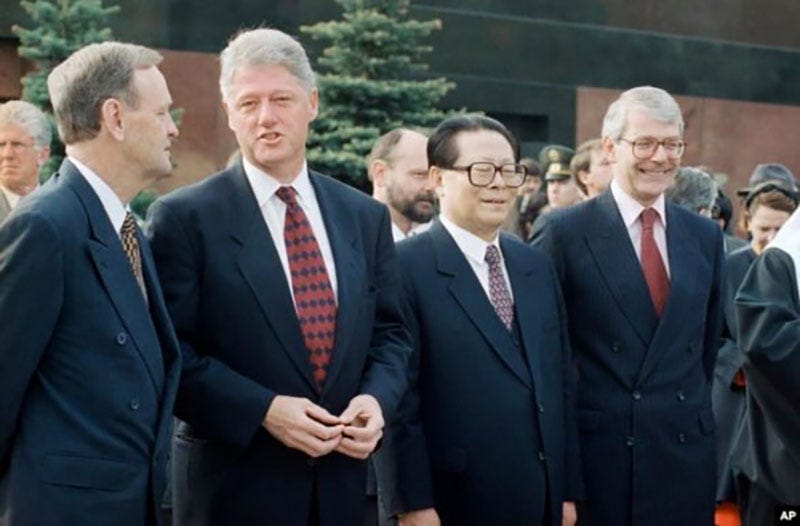No More “Never Again”
How Putin Turned World War II Into a Permanent Propaganda Campaign
This week, Russia will stage its most important political and propaganda spectacle of the year. On May 9, the country celebrates Victory Day — marking eighty years since the end of the Great Patriotic War, as Russians call World War II.
Victory in the Great Patriotic War is the cornerstone of Vladimir Putin’s political mythology — the foundation of his entire version of world history. The Kremlin has been preparing for this moment for months; it is the centerpiece of the regime’s propaganda calendar.
The climax will be the military parade on Red Square, scheduled for May 9. For weeks now, Russian media outlets have been tracking — often breathlessly — which world leaders are coming and which are not. The guest list is treated as a referendum on Russia’s international standing. In the Kremlin’s eyes, the more heads of state in attendance, the more “respect” Russia commands on the global stage.
Chinese President Xi Jinping is expected to attend, as are Brazilian President Lula da Silva, most leaders of the former Soviet republics, Slovak Prime Minister Robert Fico, and a host of African dignitaries. Indian Prime Minister Narendra Modi was also expected — but reportedly canceled due to escalating tensions with Pakistan. It remains unclear whether the United States will send any representative at all. In a perfect world — at least from Putin’s perspective — Donald Trump would show up, signaling a restoration of U.S.-Russia relations to their highest possible point. George W. Bush attended Victory Day in 2005, and Bill Clinton in 1995. In 2015, following Russia’s annexation of Crimea, a visit from Barack Obama in 2015 was out of the question.
Putin, George W. Bush and Laura Bush during Victory day parade in Moscow
This year’s Victory Day carries heightened significance. Modern Russian propaganda has all but equated today’s war with the Great Patriotic War. According to the Kremlin and its supporters, the war in Ukraine is merely a continuation of the war that ended in 1945. That’s why they speak incessantly of “fascists” and “Nazis,” and draw absurd parallels between the European Union and the Third Reich.
From Antifascism to Fascism
The transformation of World War II memory into pure propaganda began two decades ago, early in Putin’s presidency — shortly after Ukraine’s Orange Revolution. That moment marked a turning point: it was when the Kremlin first became truly alarmed by what it saw as the West’s attempts to force democratic change in the post-Soviet space. Russian officials even began to talk about the “export” of color revolutions. From then on, May 9 and the memory of the war became the foundation of Russia’s counter-propaganda narrative.
Until then, Victory Day had been a poignant, universally cherished holiday in Russia — a day devoted to remembering the enormous human toll the Soviet Union had paid in the war. More than 30 million people perished. Nearly every family had lost someone.
The entire Soviet cultural tradition surrounding the war was, at its core, somber. For decades, the most common toast at Victory Day gatherings was a quiet plea: “May there never be another war.” But under Vladimir Putin, the tone of the holiday has been radically reversed.
What was once a universally beloved day of remembrance has mutated into a celebration of militarism. The old pacifist motto — “May there never be another war” — has been replaced with a menacing new slogan: “We can do it again.”
“We can do it again” T-shirt on sale in Moscow
Putin’s propagandists have embedded a central message into every facet of the war’s remembrance: it was not just the Soviet Union, but specifically the Russian people, who defeated Nazism and saved the world. Therefore, the world owes Russia a debt of eternal gratitude. Any denial of this — or even mild questioning of the Soviet or Russian role — is framed as a desecration of the fallen and, by extension, an act of Nazi rehabilitation.
Even back in the 2000s, Kremlin-aligned media began talking about World War II as if it had never ended. That was when they started labeling Ukrainians, Latvians, Lithuanians, Estonians — and eventually European Union politicians — as heirs to the Third Reich.
Over the past two decades, memory of the Second World War has become the spiritual glue of Russian society. The Kremlin has turned victory in 1945 into the bedrock of state ideology — a source of national pride and a tool of political manipulation. Liberal commentators coined a darkly sarcastic term for this phenomenon: pobedobesie — “Victory mania” — to describe the cynical exploitation of wartime memory and the grotesquely inflated triumphalism over Nazi Germany’s defeat.
Bill Clinton on Victory Day parade on the Red Square
By endlessly invoking the “great victory” over fascism, the Kremlin has tried to cultivate patriotism — and, in the process, has nurtured its own brand of Russian fascism.
War instead of Victory
This rhetoric has become especially grotesque since February 2022, following the full-scale invasion of Ukraine. From the outset, the historical parallels were uncanny — and chilling. Russian forces began bombing Kyiv at 4 a.m., the exact hour the Nazis began their surprise attack on the Soviet Union on June 22, 1941, with a bombing raid on Kyiv.
Despite these haunting echoes — and the plain fact that Russia is now the aggressor — Kremlin propaganda continues to exploit the legacy of World War II to the fullest.
Strangely enough, this year’s militarized Victory Day could have offered a perfect opportunity to end the war in Ukraine. It wouldn’t be difficult for Putin to declare that the “special military operation” is over, that its goals have been achieved, and that Victory Day has finally arrived. The presence of foreign leaders in Moscow would serve as visual proof that Russia is no longer isolated — a global affirmation that the Kremlin has weathered the storm.
And yet, according to sources in Moscow, Putin is deeply unsure whether he even wants a new victory — when the old one still serves him so well. Why end the war? Why seek an agreement with the United States? Over the course of his presidency, he has watched five American presidents come and go. In his mind, they are all temporary. Why make concessions now, when everything could change again in four years?
Victory is fleeting. But for a truly fascist regime, war is the only lasting value.





